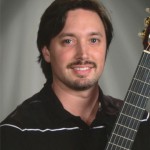 1. Tell us about your Guitar Teaching Experience?
1. Tell us about your Guitar Teaching Experience?
Guitar has always been my primary instrument, but schools rarely advertise an opening for a “guitar teacher”. After graduating with a degree in music education, I saw a posting for a chorus teacher at a nearby middle school and decided to apply. In the job interview, the principal seemed to be more interested in my background as a guitar educator than anything else. I got hired, and learned that my responsibilities included two chorus classes, and four general music classes. I included a unit of guitar in the general music class and it was a hit. After my second year of teaching, I saw an ad for Teaching Guitar Workshops (TGW) in a music education journal and decided to take it. I took Level 1 with Ed Prasse and Bob Morris at Winthrop University. It was a remarkable experience! I learned how to take what I already knew about guitar (as well as some new things!) and apply it to a new context: the classroom. When my school administration learned that I was taking the TGW, they actually proposed to me, “why don’t you turn your general music class into a guitar class”. Six years later, I have a great program that is supported by the students, parents, and administration. True story.
2. What’s your favorite thing about teaching guitar? Why?
I really look forward every guitar class. I get to make music with students (which really builds up some strong fingers!) in a way that is very connected. Many of the students take guitar as an “exploratory” class, and its great to see many of them discover an interest that they did not know they had. Teaching guitar also has a wide scope of material, from method book reading exercises to ensembles to fun styles that are uniquely suited to the guitar like rock, blues, bluegrass, reggae, country, bachata, etc.
3. What’s your least favorite thing about Teaching Classroom Guitar? How do you deal with it?
My least favorite thing about teaching guitar is the developmental phase after the newness has worn off, but before students are able to “hold their own”. Many students go from “hey, this is fun” to “wait a minute, this is hard”. I deal with this by trying to create as many opportunities for success as possible, and circling back to allow concepts that have not yet solidified to be reinforced. Sometimes you have to “put some cheese on the broccoli” and make a piece interesting that some students may see as boring. This can be done by adding a chordal accompaniment, rhythm track, bass line, loop, and isolated groups, in addition to other strategies. After a certain amount of “hands on instrument” time, students’ technical ability, ear training, muscle memory, and self-efficacy usually increase to the point that they are more likely to take ownership of their learning.
4. What are your 3 favorite lessons to teach at the Teaching Guitar Workshops?
1) Scaffolding a Song (how to play a chordal progression with a high success rate)
2) Ensemble Literature (how relatively simple parts can come together to create a very musical experience)
3) Bluegrass Guitar Overview
5. What are the top 2 reasons for a teacher to start a guitar program?
1) I believe that guitar is part of a new wave of music education. These classes have the potential to have an impact on many students who may not otherwise take a music course.
2) I’m not going to say “job security”- that is a fortunate byproduct. Nor will I say “street cred” among the students and faculty- (another fortunate byproduct). The second reason a teacher should start a guitar program is to continue to develop as a musician and and educator.
6. What are the top 2 reasons for a teacher to attend Teaching Guitar Workshops?
1) You get a TON of materials and expert instruction on how to use them.
2) You become a part of a network of guitar educators that you can continue to access long after the workshop is over.
7. What is one thing everyone will walk away with from TGW?
The confidence that, regardless of your prior guitar experience, you have the tools to start (or enhance) your school guitar program.
8. Did we miss anything?
The icing on the cake of Teaching Guitar Workshops is the option to earn graduate credit. I can’t speak for all institutions, but I was able to apply 6 credits into my graduate degrees from TGW. If you are currently in (or are considering beginning) a graduate program, this could be a great way to earn course credit while having a great time.